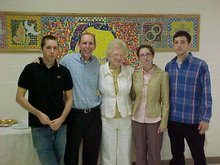The Dreams of Youth
Hindus and Buddhists are way ahead of us Westerners in terms of what their young people idealize. They’re led to idealize holiness, inner freedom, inner truth, rather than simply outer success. Our drive for outer success has given us tremendous advantages in terms of the scientific and industrial revolutions, but Asia and Africa are more able to triumph over the inner world. Wisdom is still idealized as the value that binds them together.
During my travels I was glad to see, in Africa especially, the almost universal puberty rites and initiation rites still in place. Basically they are intense, three-month “CCD programs” that work. The young people are taken apart by the wise men or women of the tribe and taught what wisdom is: “This is what holds us together as a people. This is what we stand for, this is who we are, these are our values.” And when those young men and women return from those kind of groupings, they know who they are.
In our culture, we’re forever searching for our values, what we want to believe in, what we might want to commit ourselves to. Adolescence, the time of open options, now lasts until age thirty-two in the West! In some cultures, adolescence really ends as early as sixteen and seventeen. You often see that in the self-assurance of young people who find their ground and meaning much earlier.
I suspect we actually are stunted and paralyzed by having too many options. We are no longer the developed world; we are the overdeveloped world.
from Letting Go: A Spirituality of Subtraction - Richard Rohr
African Lessons
(Written by Richard Rohr in Africa) The missionaries here love to talk about their peoples. At every meal, I inquire about the ways of the different cultures: the hard-working Kikuyu, the fascinating Masai, the exotic and primitive tribes of Turkana and others. The more I travel, the more it becomes evident that it is culture what finally and firmly forms our attitudes—so deeply that we don’t recognize them as chosen attitudes. It is an emotional seeing that is not easily challenged or overcome. How will God ever make unity out of our extraordinary diversity, especially when each culture is so committed to its own pair of glasses? My best memory from this trip to Africa is the young man who gave me two of his carvings in exchange for my watch. I got the bargain: he gave me himself, his art, and took away a tyrant from my wrist. All I really gave him was my address, since he wanted to write. The poor don’t know how to lose.
from St. Anthony Messenger, “African Journal” Richard Rohr
















